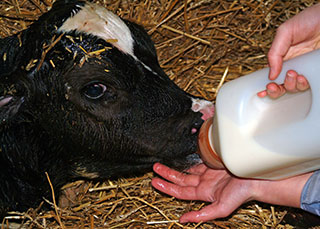A leading global expert on calf rearing is the keynote presenter at the 2014 Calf Care Conference.
Dr. Alex Bach is a professor and Director of the Department of Ruminant Production at IRTA, a government research institute in Barcelona, Spain.
His keynote address will focus on how dry cow management can impact calf health, but he will also be doing a second presentation on how to efficiently raise calves so they perform well as adults.
 “Dr. Bach is a world-renowned expert on calf health and we’re extremely fortunate that he is able to come to Ontario to speak at the Healthy Calf Conference,” says Kendra Keels, Industry Development Manager with the Ontario Veal Association. “It’s a once in a life time type of opportunity to be able to see him at our conference and learn from his expertise.”
“Dr. Bach is a world-renowned expert on calf health and we’re extremely fortunate that he is able to come to Ontario to speak at the Healthy Calf Conference,” says Kendra Keels, Industry Development Manager with the Ontario Veal Association. “It’s a once in a life time type of opportunity to be able to see him at our conference and learn from his expertise.”
Dr. Bach’s award-winning research focuses on ruminant nutrition and metabolism, as well as dairy cow and replacement management. He speaks frequently at conferences and events around the world, is extensively published, and has served as a scientific expert on several committees of the European Food Safety Authority.
Healthy Calf Conference information
The Healthy Calf Conference runs December 2 from 9 am to 3 pm at the Arden Park Hotel in Stratford, with remote locations in Northern Ontario to be determined, and December 4 from 9 am to 3 pm at the Maxville and District Sports Complex in Maxwell.
Registration fees are $80/person until November 7 and $90/person after that, as well as at the door. A student rate of $30/person is also available. To register, Click here.
Managing calves for optimal health: some tips from Dr. Alex Bach
There are four objectives that farmers should have when managing calves and heifers, according to Dr. Bach: optimizing growth, optimizing transition, minimizing health problems and ensuring genetic potential.
- Optimizing growth: think about what you want to see out of the calf and how you can get there. For example, if you’re trying to save money on milk replacer, you may end up losing money in the long term because of how lesser quality feed or reduced consumption may affect the calf in the future.
- Optimizing transition: plan what you will feed the calves during the weaning transition, and decide when you will group them and how. Bach says results from several research trials have shown calves grouped at 49 days during weaning with a once daily feeding of milk had higher intakes than those that were grouped at 56 days.
- Minimizing health: be careful not to overstock group pens as crowding can lead to respiratory problems. Pay attention to any previous health problems calves may have had and group animals based on their disease history.Ensuring genetic potential: genes can’t be changed, but management can change how they are expressed, says Bach.
 “Dr. Bach is a world-renowned expert on calf health and we’re extremely fortunate that he is able to come to Ontario to speak at the Healthy Calf Conference,” says Kendra Keels, Industry Development Manager with the Ontario Veal Association. “It’s a once in a life time type of opportunity to be able to see him at our conference and learn from his expertise.”
“Dr. Bach is a world-renowned expert on calf health and we’re extremely fortunate that he is able to come to Ontario to speak at the Healthy Calf Conference,” says Kendra Keels, Industry Development Manager with the Ontario Veal Association. “It’s a once in a life time type of opportunity to be able to see him at our conference and learn from his expertise.”